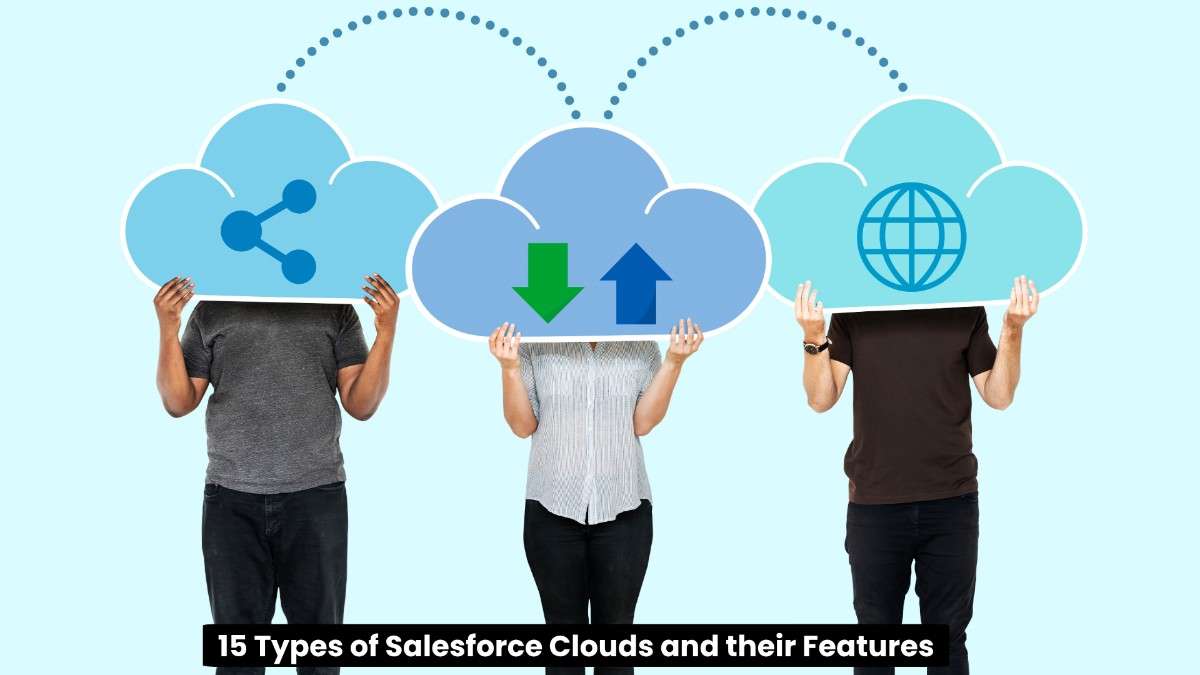15 Types of Salesforce Clouds and Their Features
Salesforce has established itself as a leader in cloud-based customer relationship management (CRM) solutions. With its wide range of specialized cloud offerings, Salesforce enables businesses to streamline operations, improve customer interactions, and drive growth across industries. Each Salesforce cloud is tailored to meet the unique needs of different business functions, from sales and marketing to healthcare and education.
In this blog post, we’ll explore 15 types of Salesforce clouds and their key features, helping you understand how each can enhance your business’s performance.
Here are 15 Types of Salesforce Clouds
1: Salesforce Sales Cloud
It is all about Salesforce Sales Cloud; it is the one CRM platform of Salesforce that encompasses all sales advantages and empowers sales teams to work more productively and as a manager of their sales processes. This provides essential tools for managing leads, opportunities, accounts, and contacts with high feature values such as lead scoring, forecasting, performance analytics, etc.
Key Features:
- Lead And Opportunity Management: Manage and identify and prioritize leads and opportunities all in one place.
- Sales Analytics: Get all sorts of information regarding sale performance to be data-driven for decision-making.
- Workflow Automation: Automate repetitive tasks to gain increased efficiency.
Going with Sales Cloud helps businesses earn more because their sales processes will be better streamlined, team collaboration will become even easier, and deals will be closed quickly.
2: Salesforce’s Service Cloud
Salesforce Service Cloud aims to help companies provide top-tier customer support and service. It encompasses tools for case processing, service automation, and omnichannel support-thus ensuring that the customers are relieved in time with maximum effectiveness.
Some Key Features:
- Case Management: Track customer issues efficiently and resolve them.
- Omnichannel Support: Customers are provided support on various channels such as Phone, e-mail, chat, and social media.
- AI Service: Utilize AI to automate responses, predict customer issues, and personalize the service.
The advantages of Service Cloud will help businesses work on customer satisfaction, streamline service workflows, and reduce response time.
3: Salesforce Marketing Cloud
The Salesforce Marketing Cloud nurtures personalized marketing campaigns creating an engagement for the customer at every touchpoint. It interlocks with power tools for e-mail marketing, social media managing, content personalization, and customer journey mapping.
Some key features:
- Email Studio: Parameters for email campaigns that are fine segmented and created.
- Social Studio: Social media posts planned, tracking activity, and engagement with users.
- Journey Builder: Take your customer journey, automate, and personalize cross-channel experience.
With the Marketing Cloud, companies can stay focused on marketing efforts with targeted campaigns that bring engagement and loyalty.
4: Salesforce Experience Cloud
Salesforce Experience Cloud provides tools for businesses to create branded online communities or portals for customers, partners, and employees. Seamless collaboration, knowledge sharing, and self-service capabilities are enabled.
Some of the key features:
- Community Builder: Customize and design branded communities without a ton of hand coding.
- Knowledge Base: Give self-service resources and FAQs to empower customers.
- Collaboration tools: Allow partners and employees to work together in real time.
Experience Cloud spreads the sense of community and keeps customer relationships intact by providing valuable resources and a platform for collaboration.
5: Salesforce Vaccine Cloud
The Salesforce Vaccine Cloud is a tailored solution that assists organizations with their management and tracking of vaccine distribution efforts. During its inception, it was designed for government bodies, health care providers, and organizations involved in responding to pandemic situations.
Key Features:
- Vaccination tracking: Organize all vaccine distributions, schedule appointments, and keep patient records.
- Data Analytics: Track vaccination trends and modify the strategies of vaccination rollouts accordingly.
- Real-Time Reporting: View dashboards and reports to measure vaccination metrics.
Vaccine Cloud makes vaccine distribution swift, transparent, and scalable, therefore fostering public health projects.
- Salesforce Manufacturing Cloud
The Salesforce Manufacturing Cloud is customized to serve the peculiar needs of a manufacturer by enabling tools to improve their operation, sales, and service in the businesses of manufacturing. It also facilitates real-time visibility into the production process so that manufacturers can quickly react to changing market demands.
Key Features:
- Sales Agreements: Manage and forecast sales agreements and contracts.
- Production Planning: Optimize production schedules and reduce waste.
- B2B Sales and Service: Deliver a seamless experience for business customers.
The Manufacturing Cloud will improve collaboration between the sales, service, and production teams to create better operational efficiencies.
- Salesforce Integration Cloud
Salesforce Integration Cloud provides a single platform for integrating third-party applications and data sources with Salesforce. It simplifies the task of data synchronization and assigns its flow across different systems within an organization to enable it to function as a single source of truth.
Key Features:
- Integration Connectors: Integrate Salesforce with external applications and services with ease.
- Data Orchestration: Automatic and manage data workflows between systems
- Custom APIs: Create custom integrations with external systems.
Integration Cloud gives organizations the tools they need to combine diverse systems so that users can easily access data, thereby improving overall productivity.
- Salesforce IOT Cloud
The Salesforce IOT Cloud connects the Internet of Things device with Salesforce to enable processing of data in real-time and facilitates the creation of insights for necessary actions. It helps organizations create customized instances and trigger automated actions based on IoT data.
Key Features:
- Device Data Management: Gather and manage data from connected devices.
- Real-Time Event Processing: Analyze and respond to data coming from IoT devices in real time.
- Custom Workflows: Automate actions from the device data, such as sending alerts or initiating maintenance.
Using the IoT Cloud assists the organization in making timely, data-proven decisions and in providing proactive, useful services to its customers.
- Salesforce Health Cloud
The Salesforce Health Cloud is a tailored application for health scope organizations, providing an interface for tracking patient relationships, streamlining workloads, and ensuring personalized care.
Key Features:
- Patient 360: View 360 degrees of patient information and history.
- Care Coordination: Collaboration of care teams, doctors, and patients.
- Health Analytics: Analyze patient data for better health outcomes.
Health Cloud opens up healthcare opportunities for better patient engagement, minimized operational inefficiencies, and better care delivery.
- Salesforce Financial Services Cloud
The Salesforce Financial Services Cloud has been designed as an all-encompassing solution for financial institutions, such as banks, wealth management firms, and insurance companies. It allows these organizations to manage customer relationships, streamline workflows, and give personalized financial advice.
Key Features
- Client Profiles: View clients in a complete 360-degree profile including financial portfolios.
- Financial Planning Tools: Monitor and plan for client financial goals.
- Data-Driven Insights: Leverage analytics to provide individualized advice and recommendations.
Financial Services Cloud helps firms deliver improved services and manage client relationships more effectively.
11. Salesforce Government Cloud
The Salesforce Government Cloud delivers secure and scalable solutions specially architected for government agencies and public sector organizations. Features include citizen service improvements, increased transparency, and streamlined government operations.
Key Features:
- Data Security: Use secure data management and ensure compliance with government regulations.
- Citizen Engagement: Communicate and deliver services to citizens better.
- Case Management: Manage government cases, claims, and requests efficiently.
Government Cloud assists in improving efficiency, transparency, and service delivery for public sector organizations.
12. Salesforce Revenue CPQ Cloud
The Salesforce Revenue CPQ Cloud simplifies this quoting and sales process to allow sales teams to accurately generate quotes quickly according to pricing models and discounts, and product configurations.
Key Features:
- Automated Pricing: Automate price calculations and discounting rules.
- Quote Management: Simplify the quote generation and management process.
- Sales Forecasting: Advanced forecasting tools for insight into revenue prediction.
CPQ Cloud ensures reduced quote-related errors while speeding up the sales cycle.
13. Salesforce Commerce Cloud:
The Salesforce Commerce Cloud is an eCommerce solution that helps organizations develop personalized, scalable, and seamless online shopping experiences and combines two kinds of commissions: business-to-business (B2C) and business-to-business (B2B) capabilities.
Key Features:
- Omnichannel Commerce: Provide a consistent shopping experience across web, mobile, and in-store.
- AI-Powered Personalization: Use AI to deliver personalized product recommendations.
- Order Management: Manage inventory, fulfillment, and customer orders efficiently.
Commerce Cloud enables businesses to enhance their online presence and improve the customer’s shopping experience.
14. Salesforce App Cloud
Salesforce App Cloud enables businesses to build custom applications on the Salesforce platform. It supports app development, deployment, and integration, assisting the creation of corporate solutions according to their needs.
Key Features:
- App Development Tools: Create custom apps using tools like Lightning App Builder and Apex code.
- App Integration: Integrate with existing Salesforce data and third-party applications.
- App Deployment: Deploy and maintain apps in different environments.
App Cloud fast-tracks digital transformation by empowering companies to develop apps that enhance customer experience and foster innovation.
15. Salesforce Education Cloud
Salesforce Education Cloud serves educational institutions by providing an encompassing platform to manage student data, promote engagement, and better learning experiences.
Key Features:
- Student 360: Full view of student academic progress and interactions.
- Course and Enrollment Management: Handling course offerings, student registration, and scheduling.
- Engagement Tools: Communicate with students and parents through personalized emails, messages, and alerts.
Education Cloud helps institutions improve student outcomes, enhance communication, and streamline administrative processes.
Conclusion
With the ever-changing nature of modern business, the right technology becomes necessary to keep a competitive edge. Salesforce offers a comprehensive suite of 15 specialized cloud services that provide tailored solutions for organizations to streamline their operations, improve customer relationships, and explore new avenues for growth. Be it improving sales through Sales Cloud or delivering exceptional services through Service Cloud or even transforming healthcare through Health Cloud-Salesforce has tools to cater for various business needs.
Each Salesforce Cloud has a distinct function with strong bolt-on features that share seamless interoperability. Its integration empowers organizations to articulate a holistic strategy, keep productive, and remain nimble as market trends ebb and flow. Consequently, Salesforce solutions allow businesses to streamline processes and create tailor-made experiences while operating efficiently.
As the years go by, with every new technological evolution, Salesforce Clouds will drive a competitive differentiator that keeps businesses one step ahead of their competition. In short, Salesforce enables organizations to overcome unique challenges, discover new opportunities for growth, and thrive in an increasingly digital world.














Post Comment
You must be logged in to post a comment.